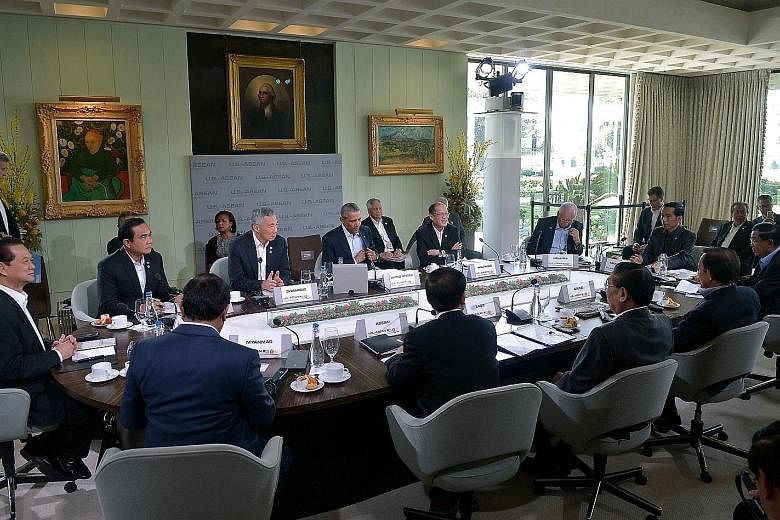While Prime Minister Lee Hsien Loong remains hopeful that the massive Trans-Pacific Partnership (TPP) free trade pact will be ratified before United States President Barack Obama leaves office next year, he is concerned about the anti- trade rhetoric coming from candidates vying for the White House.
At the heart of the problem, Mr Lee said, is the way the campaign messages could sway opinions.
"It sours the mood on the ground, because by working up these sentiments, the candidates make it harder later - if in fact they want to sign it - to change their position. Meanwhile, people would have been entrenched in their attitudes," he said in an interview with Singapore media after attending the second day of the US-Asean Leaders Summit.
"So it is always a worry and it is not quite done, but we hope very much that President Obama will be able to clear this and not leave it as unfinished business for his successor."
Mr Lee wrapped up his week- long visit to the US on Tuesday.
The 12-nation TPP - of which Singapore is a founding member - has been berated as a bad deal by both Republican and Democratic presidential candidates on the campaign trail.
Even normally pro-trade Republicans have called it a bad deal, while Democratic front runner Hillary Clinton has also turned against it despite having supported the pact when she was secretary of state during Mr Obama's first term.
Mr Lee noted also that the nature of American politics is such that campaign rhetoric may not always reflect what a candidate is going to do after he wins the presidency.
"I mean, if you look at the history of it, on the campaign trail, often you have a candidate or many candidates who take strident positions against China. But when they become president, all of them have to look at the problem seriously, reality sinks home and almost every president since (Richard) Nixon has concluded that he has a stable, sound relationship with China. So we hope that will be the case for the TPP," he said.
The summit concluded on Tuesday with the leaders taking a group photograph in front of the scenic desert mountains that surround the Sunnylands estate.
Over the course of two days, the leaders discussed a wide range of issues, ranging from trade and security to terrorism and climate change.
The US also unveiled a new Asean-US Connect programme, meant to boost economic engagement in the region.
At the session on transnational challenges on Tuesday, Mr Lee warned that South-east Asia is vulnerable to the threat posed by the Islamic State in Iraq and Syria militant group, even though the region is far from the Middle East. He also urged the US to continue to exercise its leadership on climate change.
He said in the interview with Singapore media that the discussions at the summit were good, with the main takeaway being the indication of how much weight the US gives to its partnership with Asean.
"This administration wants to do all it can to institutionalise it (the relationship) so that the next administration, whoever is president and whichever party is in power, will take it another step forward, which is good for Asean and good for the US."

